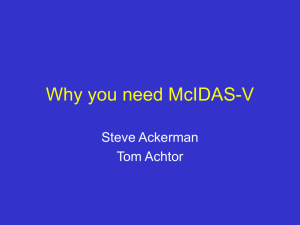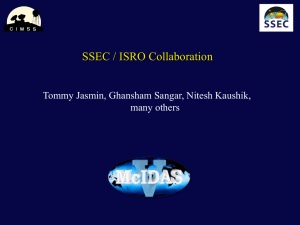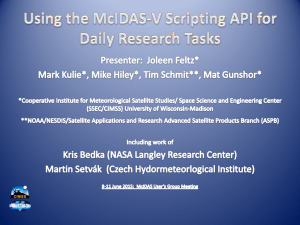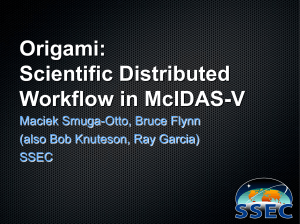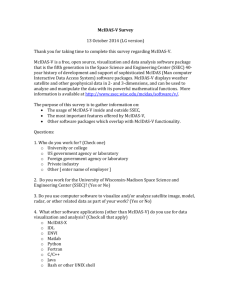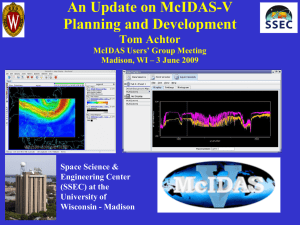Why you need McIDAS-V Steve Ackerman Tom Achtor
advertisement
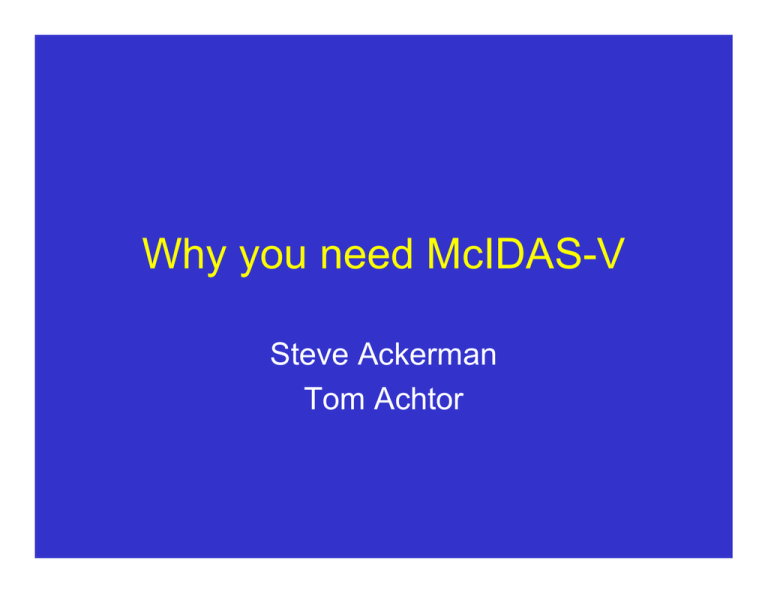
Why you need McIDAS-V Steve Ackerman Tom Achtor Introduction • What is McIDAS-V? • Why I want it? • Why you will want it! What is McIDAS-V McIDAS-X Æ VisAD + IDV + HYDRA = McIDAS-V VisAD Developer: Bill Hibbard, UW SSEC • Open-source, Java library for building interactive and collaborative visualization and analysis tools • Features include: – Powerful mathematical data model that embraces virtually any numerical data set – General display model that supports 2- and 3-D displays, multiple data views, direct manipulation – Adapters for multiple data formats (netCDF, HDF-5, FITS, HDF-EOS, McIDAS, Vis5D, etc.) and access to remote data servers through HTTP, FTP, DODS/OPeNDAP, and OpenADDE protocols – Metadata can be integrated into each data object What is the IDV? • Unidata developed, VisADbased, scientific analysis and visualization library and toolkit • Open Source, Java™ framework and reference application • Provides 2- and 3-D displays of geo-scientific data (plus, of course, animations) • Stand-alone or networked application http://www.unidata.ucar.edu/idv What is the HYDRA? • HYperspectral-view for Development of Research Applications • Open Source, Java™ framework • Used in research to visualize, analyze and combine satellite data and products • Stand-alone or networked application • Used as an international satellite remote sensing training tool http://www.ssec.wisc.edu/hydra/ HYDRA enables interrogation of multispectral and hyperspectral fields of data – Individual pixel location and spectral band measurements can be easily displayed – spectral channels can be combined in linear functions and the resulting images displayed – false color images can be constructed from multiple channel combinations – scatter plots of spectral channel combinations can be viewed – pixels in images can be found in scatter plots and vice versa – transects of measurements can be displayed – L2 products; e.g. soundings of temperature and moisture as well as spectra from selected pixels can be compared – integrated data exploration and analysis between GEO and POLAR observing platforms McIDAS-V Functionality McIDAS-V will be a collection of software tools, and networked services and data designed to take advantage of a scalable distributed computing environment to meet user needs • McIDAS-X • OPeNDAP / OpenADDE • Open GIS Consortium • Database archives • Cluster computing Why I want McIDAS-V • Education • Research • Presentations Why I want McIDAS-V • Education – Ease of use – 3-D interaction and overlays – Batch processing – Free software • Research • Presentations AIRS Cirrus vs Clear Sky Spectra Why I want McIDAS-V • Education • Research – New data sets easy to handle – Quick data analysis and visualization – Batch processing – Programming capability • Presentations AIRS MODIS CALIOP Cirrus study AIRS MODIS CALIOP Cirrus study AIRS MODIS CALIOP Cirrus study AIRS MODIS CALIOP Cirrus study Mt Etna viewed by AIRS 28 Oct 2002 SO2 signal 1284-1345 cm-1 Why I want McIDAS-V • Education • Research • Presentations – Publication quality images Live Presentation Why you want McIDAS-V • Training (Education) • Weather System Analysis (Research) • Presentations (Presentation) All McIDAS Functionality Gartner’s Hype Cycle Visibility Peak of Inflated Expectations Slope of enlightenment Trigger Trough of Disillusionment Time Plateau of Productivity Gartner’s Hype Cycle for McIDAS… Visibility GARP McIDAS-X HIS? Satellites Time Visibility Gartner’s Hype Cycle McIDAS-V… Today GOES-R High spectral instruments 3-D visualization and interaction Time Project Requirements • Create a powerful and versatile software system for environmental data processing, analysis and visualization • Support existing and evolving needs of scientific research and algorithm/applications development for new programs • Support data fusion and algorithm interoperability from existing and future sources • Continue to fully support McIDAS Users’ Group (MUG) and McIDAS-X functionality as users transition to McIDAS-V • Support operational users by providing frameworks in McIDAS-V, enabling a natural transition path for research results into operations • Use system to educate students in remote sensing and physical sciences; involve students in its development, evolution and use SUMMARY • I’ll want it…. • You’ll want it… • Take the workshop on McIDAS-V – First hand experience – Provide feedback
